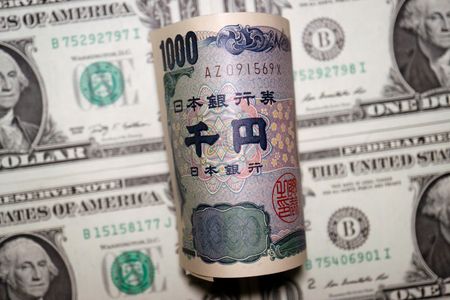By Elizabeth Howcroft
PARIS (Reuters) -European stocks held steady on Friday, the dollar was steady and oil prices eased, as market-watchers waited for U.S. inflation data and the expectation of future rate cuts kept traders broadly bullish.
Wall Street had closed higher on Thursday, as sentiment got a boost from the White House confirming that U.S. President Donald Trump would meet Chinese President Xi Jinping next week as part of his trip through Asia. The meeting, which would come ahead of a November 1 deadline for further U.S. tariffs on Chinese imports, was seen as a sign of slightly easing tensions between the U.S. and China.
China’s Shanghai Composite Index rose 0.4%, having hit the highest since August 2015, and European markets initially opened higher, before becoming mixed and struggling for direction.
At 0850 GMT, the pan-European STOXX 600 was down by less than 0.1% on the day, on track for a weekly gain. London’s FTSE 100 was also little changed.
The MSCI World Equity index was up by around 0.1%, set for a 1.2% gain on the week overall.
U.S. stock markets have surged this year, hitting record highs as traders pour money into artificial intelligence and bet that the U.S. Federal Reserve will continue to cut rates.
On Friday, investors were waiting for U.S. inflation data, which has been delayed due to the government shutdown. The Consumer Price Index (CPI) report, which is due later in the session, is expected to show core inflation having held at 3.1% in September.
The Fed is expected to cut rates by 25 basis points at its meeting next week.
“It’s just a continuation of a broadly supportive environment for equities where interest rates are broadly coming down across the developed markets, probably with the exception of Japan, volatility after a brief spike has started to come down again, there’s no major earnings surprises,” said Peter Fitzgerald, chief investment officer for macro at Aviva Investors.
“It’s always impossible to predict when a bull market is going to end or what exactly is going to end it,” he said, adding that he would expect an eventual market correction to come from AI and large technology companies.
CANADA TRADE NEGOTIATIONS CANCELLED BY TRUMP
The dollar index was at 99.045, up by around 0.1% on the day.
The Canadian dollar saw limited impact from Trump saying on social media that he was ending all trade negotiations with Canada, over what he said was a fraudulent advertisement in which former and late President Ronald Reagan spoke negatively about tariffs.
The yen weakened as the nation’s new prime minister pledged economic stimulus, with the dollar-yen pair at 152.97.
The euro was steady at $1.1611. Euro zone business activity unexpectedly grew at a faster pace in October, data showed. Euro zone government bond yields rose, with Germany’s Bund yields hitting 2.612%, after the data.
Oil prices, which had risen 5% after the U.S. sanctioned major Russian oil companies, eased back down but were still on track for a weekly gain.
Gold was down around 1.5% on the day at $4,064.26 per ounce, and on track for a weekly loss, ending its nine-week winning streak. Gold funds had received their largest weekly inflow on record in the week to Wednesday, Bank of America Global Research said.
Five of the so-called “Magnificent Seven” U.S. companies at the centre of the artificial intelligence boom, including Apple and Microsoft, are due to report earnings next week. Chipmaker Intel’s earnings on Thursday beat expectations.
(Reporting by Elizabeth Howcroft in Paris; Editing by Toby Chopra)











